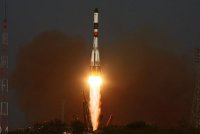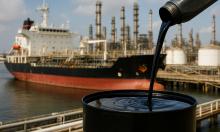Progress freighter stains reputation of Russian space industry
Progress M-12M cargo spacecraft, which blasted off from Baikonur space port on Wednesday, Aug.24, failed to enter the final orbit. The spacecraft ascended, but then began to descend, fell into pieces and burned in dense layers of Earth's atmosphere. The fragments of the unmanned rocket crashed in taiga of Russia's Altai region, RIA Novosti reports.

A source from Interfax news agency said that there were neither destructions nor victims in the area of the crash. However, Alexander Borisov, the head of the Choisky district of the Altai region, said that the debris of the spacecraft may have crashed on a populated area. According to eyewitnesses, there was a very strong explosion during the crash.
Specialists say that the unexampled incident may lead to very unpleasant consequences. First and foremost, the crash casts doubts on the reliability of supplies for the International Space Station. The unfortunate launch of Progress cargo spaceship also struck a blow on the reputation of the Russian space industry. To crown it all, the crash of Progress could harm the ecology of the region. EMERCOM officials warned local residents that the fragments of the spaceship were toxic.
The official reasons of the incident have not been unveiled yet. A source from the Russian space industry told RIA Novosti, though, that the spacecraft may have failed to develop the required orbital speed.
Russia has already suspended the launches of Soyuz booster rockets for the time of the investigation, officials with the space industry told Interfax. In addition, the scheduled launch (for Aug. 26) of Glonass-M navigational satellite from Plesetsk space port will be delayed.
The Russian Progress M-12M spacecraft was launched from Baikonur on Wednesday . The cargo ship was supposed to separate from Soyuz booster rocket at 17:09 MSK. Supposedly, the engine system malfunctioned and shut off during the 325th second of the flight of the carrier rocket.
Afterwards, the space freighter partially burned in the atmosphere and crashed on Earth along with the third stage launcher.
The launch marked the first failure in 30 years of the history of Soyuz-U boosters and Progress freighters.
A group of rescuers from the Russian Emergencies Ministry set off on Thursday for the search of remains of the Russian Progress M-12M space freighter in south Siberia, RIA Novosti reports.
Alexander Borisov, the head of the Choisky District, where the wreckage is thought to have fallen, said it would be hard for rescuers to reach the area where the spacecraft's remains were. He also said that the crash affected only the nature and added that he had not received any information about possible victims.
The official confirmed the information about the explosion that occurred during the flight. According to him, the blast shook house windows in the radius of 100 kilometers. "I've been living here for 40 years, and the people are used to the fact that stage launchers often fall here from space. But such a strong explosion has never happened before," Borisov said.
Specialists have already determined that the fragments crashed near the settlement of Bezhel-Bik in the south of the Choysky district, only 40 km from the settlement.
Toxic components of the fuel, which Progress was supposed to deliver to the ISS, could have fallen into Katun and Bia rivers of the region. Soyuz-U booster uses ecologically pure fuel: liquid oxygen and kerosene, so the debris of the third stage launcher could not harm the environment, officials said.
Progress M-12M was supposed to deliver a standard set of cargo to the ISS, including several paintings by landscape artist Alexander Shilov. The paintings were included as a form of psychological support for the crew.
The freighter was also carrying food, water, books, gifts, fuel, medical equipment, linen, personal hygiene means, equipment for scientific experiments, etc. The weight of the cargo totaled 2.67 tons. The freighter was insured for 3 billion rubles.
The ISS crew will now have to save their food because of the failed launch of the space freighter. The crew will not suffer from the shortage of food and water, officials said.
The next manned launch to the ISS may be delayed because the spacecraft with the crew is also carried by Soyuz booster rockets. In addition, Russia may break its obligations with NASA for the delivery of astronauts to the ISS and back.
Subscribe to Pravda.Ru Telegram channel, Facebook, RSS!




